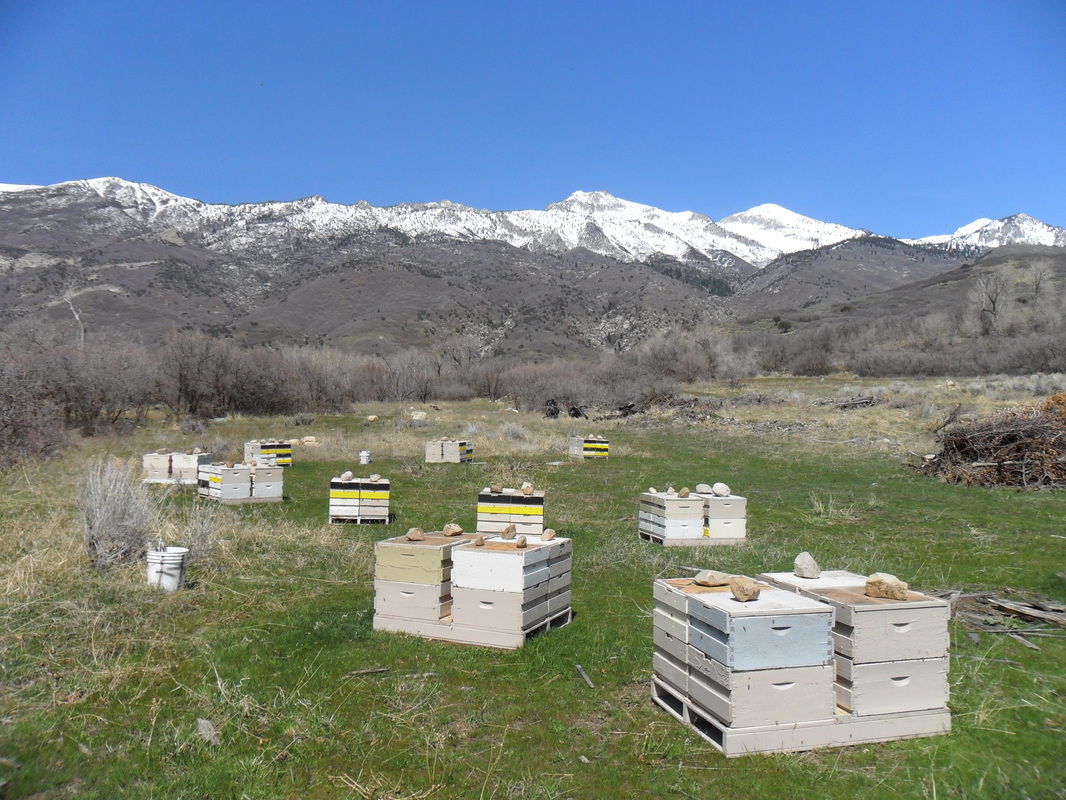|
ORGANIC OR NOT written by Peter Somers of THE HONEY STOP in Salt Lake City, UT Honeybees can fly over eight miles from the hive to gather quality nectar. The average distance is about 2 miles, & 1 .8 miles is the distance recommended for the establishment of an organic forage zone. The National Organic Standards Board (NOSB) acknowleges that bees will travel beyond this zone "even in well-managed operations with sufficient forage in the forage zone." USDA organic means 95% organic, but there is no mention of how this is being calculated in the case of foraging honeybees. And why is this distance only a recommendation? The National Organic Program was launched over a decade ago, but the USDA still does not have organic standards for honey. They have them for livestock, & these are the standards by which third party agents have been certifying honey. It's better than nothing, but cows don't usually fly from their pasture in search of greener grass. Specific behavior by honeybees calls for specific standards for organic certification. Places like Europe & Canada have honey standards. But consider this excerpt from the US Code of Federal Regulations: "...there are no existing programs that require the official inspection & certification of honey." If you're not confused, then eat more honey. Healthy, active minds should all be confused at this point. It has been the task of the NOSB to develop organic certification laws for beekeepers. But their proposals have not been accepted into regulation & will remain recommendations until approved by the USDA. Blame it on the speed at which the organic market has been growing, or the bureaucratic clown party that often ties these things up. Is corruption to blame? Conflicts of interest? The Cornucopia Institute reported last year that "an employee of General Mills, a $1.5 billion agribusiness, held the scientist's slot on the board, & an employee of another big agribusiness, Organic Valley, held one of the four farmer slots." Suppose the USDA finally did adopt organic honey standards into regulation. This would hardly ensure organic honey. In 2008, 15 of 30 federally accredited certifiers were placed on probation for violations of USDA organic standards. And if you're a small business with annual revenues below $5,000, you are exempt from organic certification requirements. You don't need Bill Lumbergh nosing around your operation with his clipboard & bottle of hand sanitizer. It's organic if you say it is. Beekeepers have shared reverence for the environment long before sustainable farming became the need of the hour. However, to demonstrate that the land you don't own is organic for miles around & that every water source is pure may not always be practical. Most organic honey is imported by developing countries, such as Mexico & Brazil. To be worthy of the USDA seal, the honey must meet its own country's organic honey standards, as well as our own. But, we don't have any such standards. The faith lies with the foreign government's certification process. Don't stop buying organic honey if that is your preference. Your purchase demonstrates increasing consumer demand for responsible & sustainable agricultural practices. And that is a very good thing. But, understand the seal. And take your grain of salt with a drop of golden honey. Preferably Cold Extracted. Addendum: By Aaron of Living Honey Due to the proximity of Living Honey Apiaries to our Utah communities, we don't attempt to officially certify or self certify our "Living Honey" as organic as we feel the label to be somewhat meaningless in light of the info presented above. To add insult to injury, many beekeepers or packagers then go on to heat their honey, effectively destroying the "ORGANIC HONEY" that they worked so hard to gather in the first place. Despite the fact that we don't certify our honey to be organic, we are of the opinion that our bees are foraging from the wild flowers of the rocky mountain foothills & gathering wonderful & healthy nectar for your enjoyment. And of course our honey is never heated. Based upon these factors, it is finally left up to you, the consumer to get to know your beekeeper to the best of your ability so that you can, in the end, have confidence that you are getting the best honey possible.
2 Comments
5/14/2014 07:51:21 am
some truly interesting information , nicely written and broadly speaking user genial .
Reply
Leave a Reply. |
The Alpine Beekeeper
Hi I am your local beekeeper in Alpine, Utah. Archives
June 2013
Categories |
Home of 100% Cold Extracted Honey - Never Heated - Never Filtered



 RSS Feed
RSS Feed